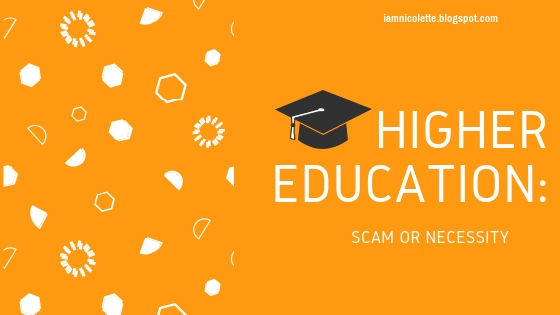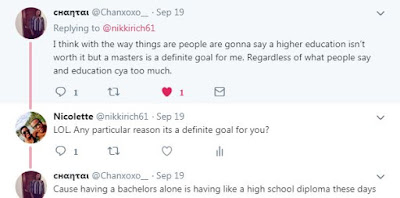Higher Education: Scam or Necessity
The short answer could be that the only real key to success is to be born in a wealthy family (not only financially, but having a wealth of connections - more often than not they go hand-in-hand though) - a family that can afford you options. So maybe you don't have to do that undergrad degree now; perhaps you can take the year to find out what you really want to do. A family that has the "right connections" so maybe if you don't have the exact qualifications you may still be able to get that job.
But, I digress.
Using examples from my own family (as I always do lol), education and more specifically higher education in skills-based areas was/is very important. This is faintly more apparent in my father's side of the family than my mother's - and I wonder whether the fact that he grew up in rural Jamaica (really rural lol) and she grew up in Kingston (but visited relatives in "country" fairly often) has a part to play in that. Either way, they both grew up in very humble circumstances where hard work was seen as the key to a better life.
But hasn't that always been the message? Surely this mentality can be traced back to slavery: if you focus and work hard massa (the slave master) will have no reason to beat you today. It probably was the lie they told us (darker folk - read: Black people) when inequality was apparent in newly independent Jamaica. That sentiment would also be the same for anyone from lower socio-economic classes (which probably would have been darker people anyway). So we decorated ourselves with all these degrees and scholarships to ensure that the fairer ones among us, or those that were better-off could see us as equal; could see that despite what they thought of your background, it got you to where you are today.
This "in spite of" sentiment is still one that exists today (in many ways I think it is just an off-shoot of modern means of oppression). The idea that scholarships show that you are bright was even passed down to me. I thought it was the only real way for people to know that I could do just as well as them (there were a few experiences with "shadism" (colour prejudice) in my childhood). It wasn't until second year of my undergraduate programme, when I insisted on applying for a scholarship, that my mother told me I shouldn't, I should leave it for those who really cannot afford the tuition. These ideals really embed themselves into our inter-generational consciousness and sometimes we act without even realizing where this thought/behaviour originated.
[ I still applied for a bursary though - much smaller award - through my Credit Union, which felt like more of a reward for being a diligent saver for all these years.]
In my family, on both sides, everyone is still a little shocked when a relative that graduates high school does not have plans to go to University (or some kind of post-secondary institution) right away. However, an excerpt from Poor Economics - a wonderful book I was reading last year, says this...
The author may have been a bit cynical but it makes sense; if there is no point in being educated (since no matter how much education you have the system is still designed to keep you back), then really ... why bother? But this also begs another question: how can we bring value to being educated?
Being educated has always been paired with having a better standard of living and as I became more aware - it seemed higher education meant higher salary. Because of course, the value placed on education -for everyone to see its value - would be monetary. Spend millions to get educated, so you can earn millions. Doesn't sound like a great strategy, but it has been working.
Postgraduate degrees are on the rise; in the US alone more people have Master's degrees now than Bachelor's degrees in the 40s and 50s (8% versus 5%). Throughout my undergraduate programme, I had not even thought to do a Master's degree ...until one of my instructors told us (close to the end of our final semester) not to rule it out, especially if we were not completely sure where we wanted a career in media and communication to take us.
I found a list of 10 reasons someone should do a Master's degree from a Global Business School website, and then found a list of 14 reasons (which turned out to be a list of 100) you shouldn't do a Master's degree, from the Business Insider.
Some of the arguments for include: the fact that it is an investment in yourself, your career and your future (that sounds like a line straight from a programme brochure); it will aid in personal development; increase job prospects; having a postgraduate degree may earn you more respect; Master`s courses are stimulating; and some careers require a higher degree.
Some of the arguments against include: the cost (naturally); removing yourself from the job market for 2 years is not wise (debt incurred could have been income earned); it takes a long time to finish; they are very few jobs when you graduate; it is too hard; psychological cost (do you have the mental fortitude to manage grad school?); and you would have to give up personal foals (regarding marriage and family).
Quite a few of these reasons for and against are pretty outlandish. So to get another perspective, I did a poll on Twitter.
So I guess my Twitter follower base still believes in the merits of higher education.A few people gave a bit more insight about their response:
Do you think it`s a scam or a necessity? Leave a comment.
--








Comments